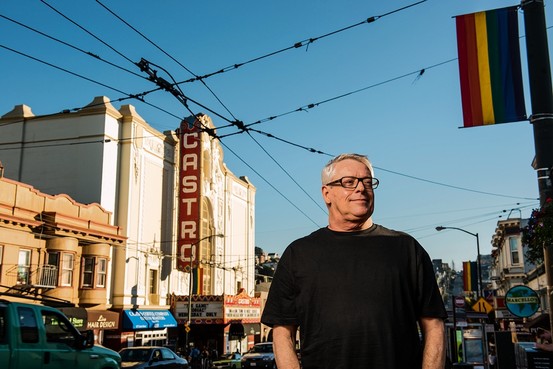Cleve Jones on our disappearing gayborhoods
I recently asked LGBTQ-rights activist Cleve Jones his thoughts on gayborhoods, and the survival of queer spaces in the face of the COVID pandemic. This is what he had to say. He spoke quickly, so this is lightly edited and condensed:
CLEVE JONES: A lot of people don’t want to hear it when I talk about this. The reality is that gay bars are going away, not just in San Francisco, but around the world. There’s a pattern from Vancouver, to Paris, to London, San Diego— everywhere you look, the traditional queer neighborhoods are going away.
The primary reason is economy: people feel these spaces aren’t needed anymore, that they can hook up without going to a bar. But there is a more in-depth conversation about what happens when we lose these gayborhoods, and when and where they emerged. Capitol Hill in Seattle, Midtown Village in Philadelphia, Lakeshore, Castro, Folsom— these were inner city places that were being de-populated in the 50’s, 60’s, and up to the 70’s.
The Castro was primarily an Irish and Scandinavian working class neighborhood, and they were voluntarily leaving. I recently had an annoying conversation with a tech person who had lived here three months and thought he knew everything. He said, “We’re just doing the same thing to you that you [gay people] did to the people who lived here.” But that’s not true; It was a phenomenon called “white flight.” The wealthy didn’t want to live there anymore, they wanted the suburbs. When gay people moved into the Castro, [the wealthy] are people who had chosen to give the neighborhood up and move to Sunset or San Mateo in search of the suburban dream. And into the Castro came us, among others, and we created community.
I don’t think in the straight world that bars and clubs have the unique importance that they do in the gay community. For us, they are more than bars and clubs. These have been places that we’ve raised money in and done organizing work. It’s not just about hooking up, and it never was about hooking up. It’s about the excitement and electricity of gay and queer people in one space. I’m a bar queen. I love going to bars, and I never hook up in a bar.
It gets pretty serious when you think about the dispersal going on. People say, “Because we can live anywhere. We can fit in anywhere.” If you believe that, I want some of what you’re smoking. [laughs] Try that out and about in the Marina. It’s more complicated; This is all about money economics: real estate that had been abandoned by the middle class and rich is now being claimed by the middle class and the rich.
After I was sheltered-in-place, I came into town and saw Twin Peaks Tavern and 440 boarded up. And when I heard about the Oasis struggling, it’s heartbreaking, really heartbreaking. I know how important these businesses are to the community. That is the reality: our community has never organized itself economically. In Chinatown and Mission, families have worked very hard, they were very smart by starting banks and credit unions; We don’t do that. We don’t transmit our wealth to the next generation of LGBTQ people. If you stand in the Castro and look up, imagine amount of wealth is concentrated in the hills. Almost none of it will remain in the community— As they age and pass away, it will mostly go to their heterosexual heirs.
I do know that COVID has accelerated the decline of our gayborhoods. When I talk about this, some people shrug, they say we don’t really need concentrations of gay people living in LGBTQ-specific areas. But when we lose them, we lose a lot.
This is an excerpt from a 1,050-word phone interview with Cleve Jones. Patreon subscribers can read the rest here.
Learn more about supporting me here (an explainer) and here (my Patreon profile).

Leave a Reply